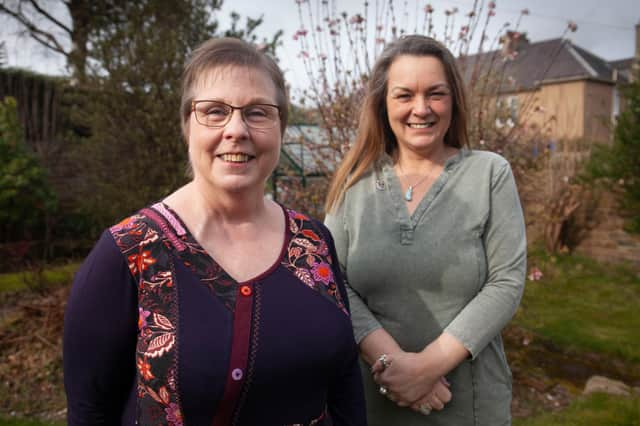“I couldn’t have lived with myself if I had done nothing’ - Edinburgh woman donates kidney to sister-in-law


Jill Cameron, 57, put herself forward as a potential donor for Rona Barron, who needed a transplant due to treatment for leukemia in her 20s causing damage to her kidneys.
The original plan was for Ms Barron’s brother Sandy to donate his kidney but having already donated bone marrow his wife said she wanted to share the load and took his place.
Advertisement
Hide AdAdvertisement
Hide AdFortunately, Mrs Cameron was a match and the successful transplant went ahead in March 2017 allowing Ms Barron to come off dialysis, and have a future free from hospital visits.
The pioneering surgery which gave Ms Barron back her freedom was first performed at Edinburgh's Royal Infirmary on Sunday, 30 October 1960, involving twin brothers from Leith.
To date this procedure, first performed by Sir Michael Woodruff has helped save the lives of 1500 Scots.
Explaining her decision to become a live donor Mrs Cameron said that she felt fortunate to be able to help her sister-in-law in this way.
Advertisement
Hide AdAdvertisement
Hide AdShe said: “I’ve been a blood donor for decades, and although this was clearly a more invasive process, I suppose donating to help others is in my nature, it’s part of who I am, so it didn’t really seem like a big deal.
“My sister-in-law knows what I’m like so she wasn’t really surprised when we told her.
“Rona had been on dialysis for over a year and I could see the impact treatment was having on her life.
“She needed something, and I was in the fortunate position of being able to give it to her."
Advertisement
Hide AdAdvertisement
Hide AdThe 15-hour long operation was a complete success and both women have recovered fully.
Mrs Camerson said: “My kidney was working before they stitched Rona up. I was told I had a very beautiful kidney which was something I suppose I’d never have known.
“I never considered the immediate impact of the surgery, I knew she’d no longer need to dialyse if it was a success, but I remember being told that she was able to pee, and feeling relieved that it was working so well, almost too well initially.”
In Scotland 400 people are currently in need of a kidney transplant and with a shortage of organs available living donors provide a life line to these individuals.
Advertisement
Hide AdAdvertisement
Hide AdDiscussing her decision to become a donor Mrs Cameron said: “Choosing to become a living donor is a very personal decision. For me, it got to the point where I couldn’t have lived with myself if I had done nothing. If the hospital had said that I wasn’t compatible then it would have been hard to take, but I would have accepted it.
“There’s a lot to weigh up, but for me, it’s about thinking about what life would have been like without that person. We’ve been in each other’s lives a long, long time and although Rona has been through a lot, we’ve had a happy outcome. She has her life back, and we have her.”
For more information on living donation, visit livingdonationscotland.org